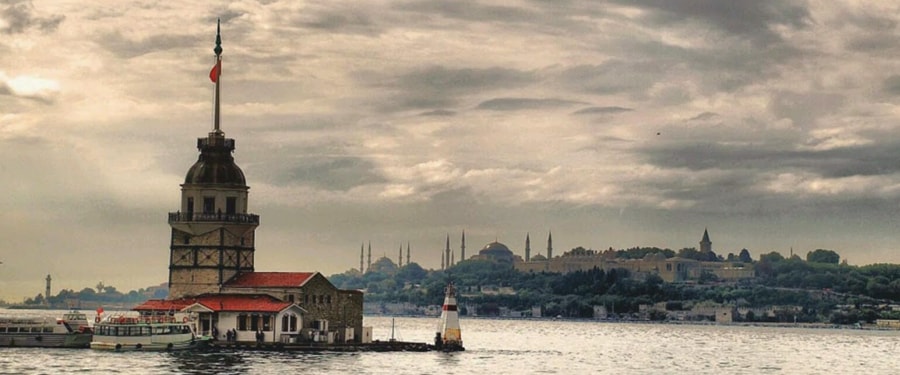
About Turkey
Here's everything you need to know before you go from what weather to expect to how to apply for a visa. There's also a list of useful products and services such as traveler's insurance companies, and much more.
Area: 780,000 sq km (as big as NSW)
Highest Point: Mt Ararat (5883 m)
Capital: Ankara
Population: the 2012 estimated population is approximately 79million; Istanbul 12 million, Ankara 3.7 million, Izmir 3 million, 32% of the population being concentrated in the northwest Marmara region. About one third of Turks are under 15 years old, less than 5% are over 65. In recent years over 300 people per week have been moving from rural and eastern Anatolia to greater Istanbul.
Language: Turkish, English is studied as second language at schools and 90% of people in tourism related fields speak English.
Religion: Officially 98% of Turks are Sunni Muslim, and 2% are Orthodox, Catholic or Protestant Christians and Jews but the State has no religion (i.e. secular).
Time: Turkish Standard Time is 2 hours ahead of Greenwich Mean Time, i.e. 8 hours behind South - Eastern Australia. It advances by one hour in summer (Apr - Oct) to GMT +3.
Currency:
Turkish Lira (TRY ) . 1 USD = 3.56 TL ( May 2017 )
Turkish Lira (TRY ) . 1 EUR = 3.99 TL ( May 2017 )
Turkish Lira (TRY ) . 1 GBP = 4.57 TL ( May 2017 )
Turkish Lira (TRY ) . 1 AUD = 2.64 TL ( May 2017 )
Weights and Measures : Metric.
Electricity: 220 volts AC. Two - pronged round plug.
Geography
Home of Ancient Civilizations
Turkey is a vast country that is sandwiched – both politically and geographically – between East and West, bordered by Greece and Bulgaria in the northwest, Iran, Armenia, Georgia to the East and Iraq and Syria to the Southeast. Turkey is as big as NSW with 3% of its land is in Europe and 97% in Asia.
The two continents of Turkey are div ided by the Bosphorus, the Sea of Marmara, and the Dardanelles in the Northwest of the county. To the North lies the Black Sea, to the South the Mediterranean, and to the West the Aegean. Altogether there is a total of approximately 8,000 km of coastline, varying from the inhospitable damp, mountainous Black Sea Coast to the thriving Mediterranean resorts, with yachts, sub - tropical gardens and discos. 80% of Turkey is 500m (1,640 ft) or more above sea level.
Climate
Although Turkey is situated in large Mediterranean geographical location where climatic conditions are quite temperate, diverse nature of the landscape, and the existence in particular of the mountains that run parallel to the coasts, result in significant differences in climatic conditions from one region to the other. While the coastal areas enjoy milder climates, the inland Anatolian plateau experiences extremes of hot summers and cold winters with limited rainfall.
There are three main climatic zones in Turkey:
• The Marmara (which includes Istanbul), Aegean and Mediterranean regions. These have a typically Mediterranean climate with hot summers and mild winters, with temperatures rising the further South you go.
• The Black Sea region, which has warm summers, mild winters and relatively high rainfall throughout the year.
• The Central and Eastern Anatolian regions (including Ankara), which have more extreme hot, dry summers and cold winters.
Religious Aspect
As visitors will notice, the Turkish Republic is a modern democracy, which is unique among Islamic countries in the Middle-East. Turkey is a modern, thriving secular country where people can choose to belong to any religion and political affiliation, as guaranteed by the Turkish Constitution itself. Although the great majority of the population is Muslim, there is a full respect and tolerance toward other religions, cultures, and descents—a tradition stretching back to the Ottoman Empire.
However, visitors should be aware that some regions in Turkey are still conservative and the traditional values of Islam are widely dominant. Very informal or revealing kind of clothing may be perceived as disrespectful in small towns and villages.
Language
The most difficult change in any society is probably language reform. Most nations never attempt it, and those who do usually prefer a gradual approach. During Ataturk’s leadership, Turkey undertook the modern world’s swiftest and most extensive language reform. In 1928, he decided to remove Arabic script, which had been used for a thousand years, replacing it with the Latin alphabet.
He asked the experts how long it would take. They said it would take at least five years. “We shall do it,” Ataturk said, “within five months.”
Today, Turkey has major universities all over the country. Outside of Europe and North America, it has one of the world’s highest ratios of university graduates to population. English and German are widely spoken in the cities, French too in places. In small villages, it can be difficult to find people who speak foreign languages but the traditional friendliness of Turkish people has traditionally overcome linguistic barriers. As we know, a warm welcome, help, and food reach across all languages and cultures. But if you learn even a few basic Turkish words, you’ll find you will be welcomed with much enthusiasm.